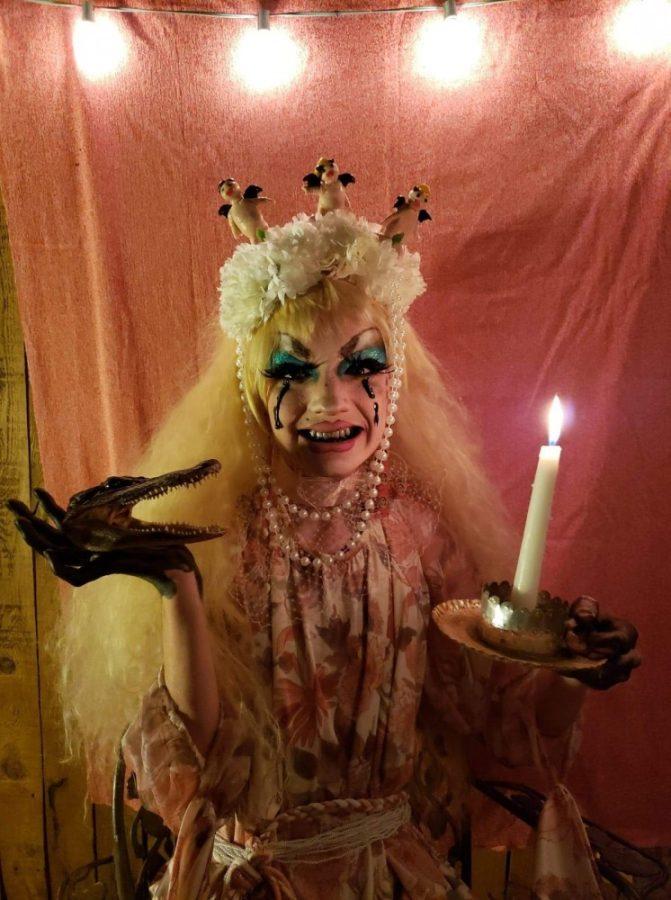Scrolling through the drag queen Piranha’s Instagram is a boldly colorful but dark aesthetic accessorized with anime and macabre stickers. However, looking past the fantasy, glitter and stickers, drag plays a more therapeutic role in Piranha’s life.
In partnership with the University of Arizona Institute for LGBT Studies, Piranha created a free workshop titled “Drag as Therapy” that will take place on Oct. 26 from 10 a.m. to noon at the Global Justice Center. However, the workshop will stay open until 5 p.m. to allow participants to continue working on their projects.
The Daily Wildcat communicated with Piranha over email to learn more.
Daily Wildcat: How did this workshop come about?
Piranha: I used to take a yoga class and the teacher Sarah Maaske posted on Instagram about the U of A LGBT workshop applications. I wrote a little abstract about my vision and sent it in to the institute and they voted for me! Sarah and I have been working together super hard to make this workshop as great as we possibly can.
DW: What issues has drag helped you solve/deal with?
P: Truly, drag has helped me deal with so much. Its helped me cope with body image issues, made me feel strong at my lowest points, helped me release government-induced rage and allows me to go into a pop-princess world when everything else is too hard.
DW: Is there a story behind your choice of drag name?
P: Honestly, I do not remember at all where the name Piranha came from. Probably a telepathic message from my alien drag queen family next galaxy over or something. Piranhas are just spooky and violent and I like that.
DW: Who can and/or should do drag?
P: Drag has a long, multicultural and often minority-based history. Modern day American drag owes a lot to black trans drag queens like Marsha P. Johnson, yet a lot of drag queens I have been unfortunate enough to encounter are racist, trans-misogynists. Drag is anti-classist, drag is anti-racist, drag is anti-transphobic, drag is anti-mysoginist, and if you dont represent that, you shouldn’t be doing drag.
RELATED: Tucson becomes a stage for international burlesque dancers
DW: You wrote “drag is expansive.” What do you mean by this?
P: “Drag is expansive” means that you can mold it into whatever you can think of. Of all the art mediums I have tried, drag is the most loosely defined. Whatever skills you have can probably be used in some way as a drag artist. You play a mean kazoo? Bring it on stage. Drag is expansive in that it’s ever-growing and expands your world. It truly makes you see your world a different way. That’s part of why it’s such a therapeutic tool.
DW: What would you recommend to those who are interested in getting involved in drag?
P: My recommendation is if you want to do drag, don’t expect to look good your first time. Do it for fun, and do it now. You do not need anything special to start. One time I didn’t have any makeup with me, so I used pastels. Don’t do that, just go to the 99 Cent Store. If you decide you want to continue doing drag, don’t mimic someone else’s look, and don’t get trapped in the Rupaul’s Drag Race world; there’s more to drag than reality TV.
DW: Are there any other organizations or other things/people that you would recommend to people who are starting to do drag to look at/explore?
P: I would recommend that you make connections while you’re starting. Community is everything. Speaking from my experience, if you are a youth starting drag, it is super hard to find spaces to perform. [Queer Youth Art Showcase] at the [Thornhill Lopez] Center on Fourth [Avenue] is a really great show to get involved in and was the first drag show I performed in. Other than that, the MOCA School of Drag is a sort of camp that came from this need I saw for youth to have a place to learn the basics of drag and performance; The School of Drag is now also open to seniors as well. Once again to bring it up, my workshop and drag show! Oct. 26 and Nov. 9! The most important thing I’ve been taught through all of this is that if something doesn’t exist, create it.
RELATED: Elvis, Tina Turner, Madonna and the Statue of Liberty walk into the University of Arizona…
DW: Do you have anything to tell those who do not want to do drag but want to help out?
P: To those who do not want to do drag but want to help with the workshop, if you have donations or wish to share information, that is all super helpful and appreciated. All the information for that can be found on the Institute for LGBT Studies Instagram and Facebook, as well as my own.
Piranha performs at the QYAS at Thornhill Lopez Center on Fourth Avenue and mentors at the MOCA School of Drag. Besides the upcoming “Drag as Therapy” workshop with the UA Institute for LGBT studies, they are also hosting a drag show at Artistic InQUEERies event on Nov. 9.
Piranha can be for found on Instagram @piranha_queen and their art account @piranha_bait.
This article was edited for clarity and AP style
Follow the Daily Wildcat on Twitter









